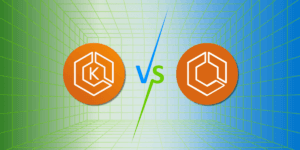Containerization has revolutionized software development and deployment, allowing organizations to build, test, and deploy applications faster and more efficiently. However, as the number of containers grows, managing and scaling them becomes increasingly challenging. Container orchestration is the process of managing and automating the deployment, scaling, and operation of containerized applications. In this article, we will explore twelve tools for container orchestration.
What is Container Orchestration and How You Benefit from It
Container orchestration is the process of managing and automating the deployment, scaling, and operation of containerized applications. Containers are a lightweight and portable way to package software code and dependencies, making it easier to move applications between different environments.
Container orchestration provides a way to manage containers at scale, making it easier to deploy and run applications in a distributed environment. With container orchestration, you can:
- Simplify deployment: Container orchestration makes it easier to deploy applications by automating the process of creating, deploying, and updating containers.
- Improve scalability: Container orchestration allows you to scale your applications up or down based on demand, making it easier to handle spikes in traffic.
- Enhance reliability: Container orchestration provides features such as load balancing and self-healing, which help ensure that your applications are always available.
- Increase efficiency: Container orchestration allows you to optimize resource usage by running multiple containers on a single host, reducing infrastructure costs.
To take advantage of container orchestration, you need to use a container orchestration platform. There are several container orchestration platforms available, each with its own features and benefits. In the next section, we’ll take a closer look at some of the popular container orchestration tools.
Reach out to our service provider
Get in touch with SliceIQ, our trusted service provider, to find out.
Overview of Available Tools
- Kubernetes – Kubernetes is currently the most popular container orchestration tool in the market. It’s an open-source platform that provides a wide range of features such as automatic scaling, load balancing, and self-healing.
- Docker Swarm – Docker Swarm is a native clustering tool for Docker containers. It’s easy to use and provides features such as rolling updates and service discovery.
- Mesos – Apache Mesos is a distributed systems kernel that provides features such as resource isolation and dynamic allocation. It supports multiple container runtimes, including Docker.
- Nomad – Nomad is a simple and flexible container orchestration tool that supports multiple scheduling algorithms and can run on multiple platforms.
- Rancher – Rancher is an open-source container management platform that provides features such as multi-cluster management, automated deployment, and centralized logging.
- Amazon ECS – Amazon Elastic Container Service (ECS) is a fully-managed container orchestration service that runs on Amazon Web Services (AWS). It provides features such as automatic scaling and integration with other AWS services.
- Google Kubernetes Engine – Google Kubernetes Engine (GKE) is a fully-managed Kubernetes service that runs on Google Cloud Platform (GCP). It provides features such as automatic scaling and integration with other GCP services.
- Azure Kubernetes Service – Azure Kubernetes Service (AKS) is a fully-managed Kubernetes service that runs on Microsoft Azure. It provides features such as automatic scaling and integration with other Azure services.
- OpenShift – OpenShift is a container application platform that provides features such as integrated container registry, automated builds, and continuous delivery.
- Docker Enterprise – Docker Enterprise is an enterprise-grade container platform that provides features such as container security, automated operations, and integrated registry.
- Portainer – Portainer is a simple and easy-to-use container management platform that provides features such as user management, container management, and container logs.
- Kubernetes Operations (kOps) – kOps is a tool that automates the deployment, scaling, and management of Kubernetes clusters on AWS. It provides features such as automated updates and backup and restore.
Each of these container orchestration tools has its own strengths and weaknesses, so it’s important to choose the one that best fits your specific needs.
In conclusion, container orchestration has become an essential part of modern software development and deployment, and it’s important to choose the right tool for your organization’s specific needs. The twelve container orchestration tools discussed in this article are likely to be popular in 2023, and each one offers unique features and benefits. Kubernetes remains the most popular tool in the market, but there are other options such as Docker Swarm, Mesos, Nomad, Rancher, Amazon ECS, GKE, AKS, OpenShift, Docker Enterprise, Portainer, and kOps. By enabling container cost optimization, you can take full advantage of the benefits of container orchestration, such as simplifying deployment, improving scalability, enhancing reliability, and increasing efficiency, while also reducing infrastructure costs. With the right container orchestration tool, organizations can streamline their software development and deployment processes, improve application performance, and ultimately deliver better experiences to their users.
If you experience issues with choosing the most appropriate tool that will fit your needs, you can schedule a call with our Cloud Expert.



